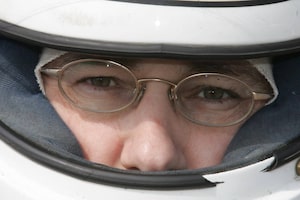The finish line at the Canadian Grand Prix commemorates the 30th anniversary of the death of Canadian driver Gilles Villeneuve.Paul Chiasson/The Canadian Press
Mercedes driver Nico Rosberg might be a championship contender, but he's doing his best not to look that far down the road.
With the highly unpredictable 2012 Formula One season offering up a different winner in each of the six grands prix so far, the 26-year-old German feels he must keep focused on the job at hand rather than his title possibilities.
"I am not really thinking about the championship yet," he said.
"Right now, it's about winning races and trying to win Canada, and that's all that counts at the moment. Qualifying? I think it will be straightforward, to be quick there, but to have the car to be quick in the race is the crucial thing, and that's the difficulty, because tires will be a big issue here."
So far, focusing on the race at hand is working. Heading into Sunday's Canadian Grand Prix at Montreal's Circuit Gilles Villeneuve, Rosberg is fifth in points with 59. Ferrari's Fernando Alonso leads with 76. Drivers get 25 points for a win, and the Canadian race is the seventh of 20 on the 2012 F1 calendar.
Two weeks ago, Rosberg, 26, finished second in Monaco about a month after he took his maiden F1 win in China, which was also the first victory for Mercedes since it returned to the sport as a manufacturer.
"It was very emotional and meant a lot to me to be the first Mercedes winner after such a long time," he said. "To share it with the whole team was very special and brought great memories. Now we want more."
Rosberg joined an exclusive club in China when he became only the third driver to win a race behind the wheel of a silver arrow. Five-time world champion Juan Manuel Fangio, of Argentina, was the last to drive a Mercedes to victory in F1 when he took the chequered flag in the 1955 season finale in Monza, Italy. The other driver to win for Mercedes was British ace Stirling Moss.
The German car maker left the sport in 1955 following a massive accident involving one of its drivers in that year's 24 Hours of Le Mans. Early in that race, a collision saw the Mercedes-Benz 300 SLR of Pierre Levegh hit the pit wall and toss huge pieces of debris into the grandstands, killing the driver and 83 spectators, and injuring 120 people in the ensuing fire.
Once the 1955 world sportscar season was complete, Mercedes announced its withdrawal from motorsport. While the manufacturer returned to racing in the 1980s, it did not get back into F1 until 2003 when it began supplying engines to the McLaren team. In 2010, it bought the Brawn squad.
With his Chinese victory, Rosberg also beat seven-time world champion Michael Schumacher to the punch. In fact, he's also outperformed his accomplished teammate since they both joined Mercedes in 2010, scoring almost double the number of points as Schumacher, 290 to 150.
"Of course I am pleased [with] how things have gone compared to my teammate, definitely. Then again, it is still a big challenge every race, because he's driving at a very high level as we saw in qualifying in Monaco [where Schumacher was fastest]," Rosberg said.
"It is very interesting to work with him, because you can see why he is a seven-time world champion; but it's not only me learning from him, he also learns from me – we exchange a lot."
The win and the championship challenge is the fulfilment of the promise that Rosberg showed in lower divisions, where he won titles in Formula BMW and GP2. He and 2008 world champion Lewis Hamilton looked to be the two big up-and-coming stars when they graduated to F1 a year apart.
Rosberg joined the mid-pack Williams team in 2006 and impressed, but he didn't make the kind of splash Hamilton created when he graduated to McLaren a year later and then won the 2008 world championship as a sophomore.
As he watched Hamilton excel, Rosberg went to races knowing he could be faster if he weren't limited by his machinery. During those times, Rosberg tried to keep things in perspective.
"I had patience, I didn't compare myself to anyone else and I wasn't jealous or anything like that," he said.
"I was enjoying the situation and the challenge, and I knew my time would come, and I would have the car to win, which was the case in China. Finally, I did have the car to win and I won – it just came a little later than for some other people, but there are worse things than that."
Should Rosberg's approach lead him to an overall victory this year, he will become only the second a son of a world champion to win a title – after 1996 world champion Damon Hill, whose father Graham won the F1 title in 1962 and 1968.
Rosberg's father is 1982 world champion Keke Rosberg, who won the prize driving for Williams. The elder Rosberg started 114 grands prix between 1978 and 1985, taking five wins, five poles and one world title.
With his last start being three decades ago, Dad can't really help his son inside the car, but he does lend advice in other areas..
"He is very wise, so he helps me with things in the background but not the driving itself," Rosberg said.
"Besides, I have more experience than him now ,so he can't give me too much advice any more because I have more races than he did in F1."
For more from Jeff Pappone, go to facebook.com/jeffpappone (No login required!)
Twitter: @jpappone
 Jeff Pappone
Jeff Pappone